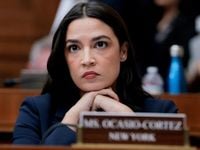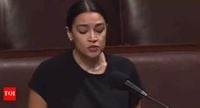On September 19, 2025, a contentious vote in the U.S. House of Representatives laid bare the deep fractures in American politics, as lawmakers clashed over a resolution honoring the late Charlie Kirk, the conservative activist and founder of Turning Point USA. Kirk, who was assassinated during a speaking event at Utah Valley University on September 10, became the unlikely focal point of a debate not just about his legacy, but about the very nature of free speech, political violence, and the boundaries of partisanship in America.
The resolution, introduced by House Speaker Mike Johnson and co-sponsored by 165 House Republicans, praised Kirk as a "courageous American patriot" who sought to "elevate truth, foster understanding, and strengthen the Republic." It expressed condolences to his wife, Erika Kirk, and their two young children, lauded his dedication to the Constitution and civil discourse, and called on Americans to "reject political violence, recommit to respectful debate, uphold American values, and respect one another as fellow Americans." The resolution also condemned Kirk’s assassination "in the strongest possible terms" and commended law enforcement for arresting and charging his alleged killer, Robinson, who now faces charges of aggravated murder, felony discharge of a firearm causing serious bodily injury, and obstruction of justice.
Despite the resolution’s passage by a wide margin—310 in favor (including 215 Republicans and 95 Democrats), 58 against, 38 present, and 22 not voting—the proceedings quickly became a lightning rod for controversy. Nearly 60 House Democrats, including prominent progressives such as Alexandria Ocasio-Cortez (AOC), Yvette Clarke, Adriano Espaillat, and Nydia Velazquez from New York, and Robert Menendez, Bonnie Watson Coleman, and LaMonica McIver from New Jersey, voted against the measure. Another 38 Democrats, including New York’s Dan Goldman and Grace Meng, voted present, while 22 opted not to vote at all.
The heart of the opposition was perhaps best captured in the fiery floor speech delivered by Ocasio-Cortez, which quickly went viral and ignited debate across the political spectrum. "The majority proceeded with a resolution that brings great pain to the millions of Americans who endured segregation, Jim Crow and the legacy of bigotry," she declared, labeling the resolution "reckless" and accusing House leadership of pushing it on a "purely partisan basis." According to Fox News, Ocasio-Cortez further argued, "We should be clear about who Charlie Kirk was: a man who believed that the Civil Rights Act that granted Black Americans the right to vote was a ‘mistake,’ who after the violent attack on Paul Pelosi claimed that ‘some amazing patriot out there’ should bail out his assailant, and accused Jews of controlling ‘not just the colleges – it’s the nonprofits, it’s the movies, it’s Hollywood, it’s all of it.’ His rhetoric and beliefs were ignorant and sought to disenfranchise millions of Americans—far from ‘working tirelessly to promote unity’ as asserted by the majority in this resolution."
Ocasio-Cortez’s remarks, while unequivocally condemning Kirk’s murder and the broader scourge of political violence—"Condemning the depravity of Kirk’s brutal murder is a straightforward matter – one that is especially important to help stabilize an increasingly unsafe and volatile political environment," she said—also highlighted her view that honoring Kirk’s divisive legacy was an affront to Americans who have suffered from discrimination and bigotry. She insisted, "We can condemn his horrific assassination and the scourge of political violence without uplifting these ideas." In a subsequent campaign email, as reported by Business Insider, Ocasio-Cortez reiterated, "It is equally important that Congress unites to reject the government’s attempt to weaponize this moment into an all-out assault on free speech across the country. All in the name of Charlie Kirk, the Trump Administration, and the FCC are now cynically threatening to shut down ABC and any outlets who give airtime to his political critics. This is a disgusting attack on the American people and the very First Amendment rights that define us as a country."
The controversy did not go unanswered. According to The New York Post, far-right Representative Marjorie Taylor Greene took to X (formerly Twitter) to accuse Ocasio-Cortez of "trashing Charlie Kirk," writing, "She is lying about him and again repeating the same vile garbage at the same time claiming to pray for his family and denouncing his assassination. There is no way forward with these people." Joel Pollak, senior editor-at-large at Breitbart News, argued, "AOC’s speech opposing a resolution honoring Charlie Kirk is a retroactive justification for his murder even while purporting to condemn it. This is why Americans are divided and this is the hatred that must be addressed with urgency. It drives everything." Even billionaire Elon Musk weighed in, bluntly calling Ocasio-Cortez an "awful person" in response to her comments, as reported by Business Insider.
The resolution’s supporters, meanwhile, emphasized Kirk’s role as a "devoted Christian," "dedicated husband," and "loving father" of two, commending his founding of Turning Point USA and his embodiment of First Amendment rights. The measure called for unity and respect among Americans, regardless of race, party affiliation, or creed, and explicitly condemned all forms of political violence. Prominent Jewish Americans and Israeli Prime Minister Benjamin Netanyahu also expressed condolences after Kirk’s death, recognizing his support for Israel and the Jewish community.
Yet, Ocasio-Cortez and other critics pointed to Kirk’s own public statements as evidence that the resolution whitewashed a history of divisive rhetoric. In a February 2024 podcast, Kirk acknowledged his views on the Civil Rights Act were "provocative," arguing that while he supported ending segregation, the Act had led to a "permanent deep state of bureaucrats" and unintended consequences like affirmative action and racial hiring quotas. On the subject of Paul Pelosi’s attacker, Kirk’s comments about "bailing out" the assailant were, according to Fox News, a critique of cashless bail policies rather than an endorsement of violence; Kirk clarified, "I’m not qualifying [the attack], I think it’s awful. It’s not right." He went on to wish Pelosi a speedy recovery and condemned the violence.
On the accusation of antisemitism, Kirk’s October 2024 podcast featured remarks blaming "secular Jews" for funding radical left-wing causes, though he later insisted, "I don't like generalizations. Not every Jewish person believes that." He also argued that some Jewish organizations had supported causes he opposed, but denied being antisemitic, stating his critics had "misunderstood it intentionally and slandered us as being antisemites." While the phrase "cultural Marxism" has been used in antisemitic contexts, Kirk maintained he was referencing specific organizations and donors rather than the Jewish community as a whole.
The debate over the Kirk resolution thus became a microcosm of the broader American culture war, with each side seeing in the episode a reflection of its deepest anxieties and values. For supporters, the vote was about rejecting political violence and honoring a slain activist; for opponents, it was about resisting the elevation of a figure whose rhetoric they found deeply harmful. The fact that 95 Democrats—including Minority Leader Hakeem Jeffries—voted in favor of the resolution, while 58 opposed and dozens more abstained or voted present, underscored the complexity and nuance of the moment.
As the dust settles, the Kirk resolution stands as a reminder of the enduring challenges facing American democracy: how to mourn victims of political violence without papering over the divisions that contributed to their notoriety, and how to honor free speech while grappling with the consequences of provocative rhetoric in a polarized age.


